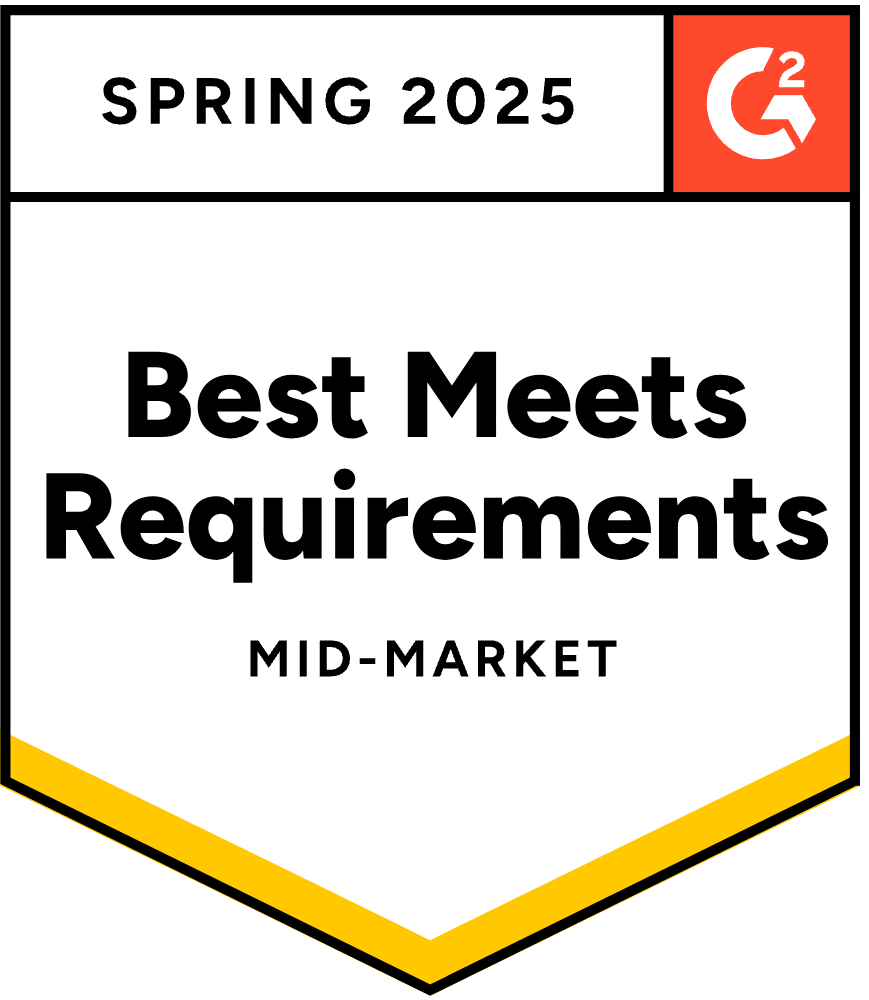- Blog
- 30 Black Friday Marketing Ideas to Try in 2025
30 Black Friday Marketing Ideas to Try in 2025
-
Nikolett Lorincz
- Marketing
- 6 min read
Table of Contents
Black Friday is more than just a shopping day, it’s a high-stakes event where businesses have the chance to significantly boost sales.
But with the competition fiercer than ever, how do you stand out?
You need a killer marketing strategy that not only grabs attention but also drives conversions.
In this article, we’ll share 30 actionable Black Friday marketing ideas for ecommerce businesses to make 2025 your most successful yet.
Let’s get started!
Why is it important to have a Black Friday marketing strategy?
Having a Black Friday marketing strategy is crucial for any online business who wants to capitalize on this major shopping event.
The term ‘Black Friday’ originated in Philadelphia in the 1960s, initially used to describe the heavy and disruptive pedestrian and vehicle traffic that occurred the day after Thanksgiving.
Retailers later adopted the term, associating it with the point in the year when brick and mortar stores would begin to turn a profit, moving from ‘in the red’ to ‘in the black.’
What started as a single day of sales has now evolved into a global phenomenon, with businesses of all sizes participating in the Black Friday frenzy.
For ecommerce businesses, Black Friday represents a golden opportunity to boost online sales, clear out inventory, and attract new customers. The high volume of shoppers during this period means you can reach a broader audience, but it also means you need to be strategic to make the most of the increased traffic.
Without a clear marketing strategy, you’re left hoping that customers will find their way to you amid a sea of discounts and deals. A solid Black Friday marketing strategy ensures that you’re not just part of the noise, but the signal that cuts through it.
30 Black Friday marketing strategies
Transitioning from theory to action, here are 30 proven Black Friday marketing strategies to help you make the most of this crucial shopping period.
1. Start planning months in advance
The success of your Black Friday marketing campaign begins long before November. Start planning months in advance to map out your goals, budget, and the offers you’ll present.
Early planning gives you time to refine your Black Friday marketing strategy, gather resources, and execute your plan flawlessly.
Break down your preparation into three stages:
- Brainstorming
- Content creation
- Final adjustments
This ensures that everything runs smoothly when the big day arrives.
2. Build anticipation
Building anticipation is key to making your Black Friday campaign a success. The more excitement you generate before the big day, the more likely customers are to flock to your online store when the deals go live. But how do you create that buzz?
The first step in building anticipation is to let your target audience know that something big is coming.
Announcing your Black Friday event early—whether on your website, via email, or through social media platforms—is a great way to get people excited.
Tease them with hints about the deals, share sneak peeks of what’s to come, and remind them to mark their calendars.
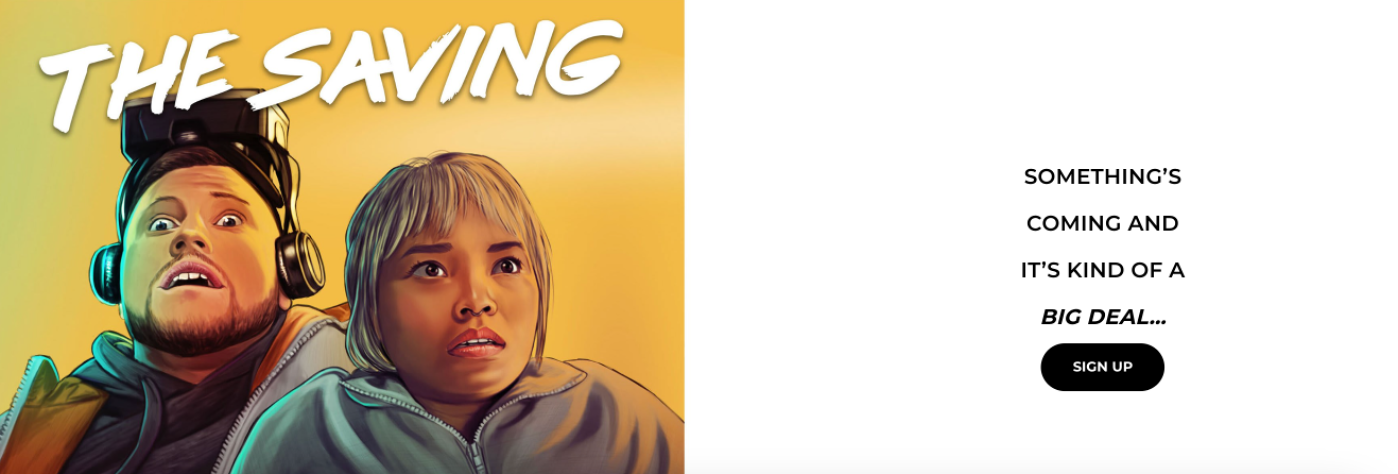
Adding a countdown timer to your website creates a visual reminder that the clock is ticking and time is running out to grab the best deals.
These timers can be placed on sticky bars—a slim, attention-grabbing banner that stays fixed at the top or bottom of your website as visitors scroll.
This way, no matter where your audience is on your ecommerce store, they’ll always have a clear reminder of how much time is left before the sale starts or ends.
Additionally, you can leverage social media to create buzz as the countdown approaches zero, fueling anticipation and excitement.
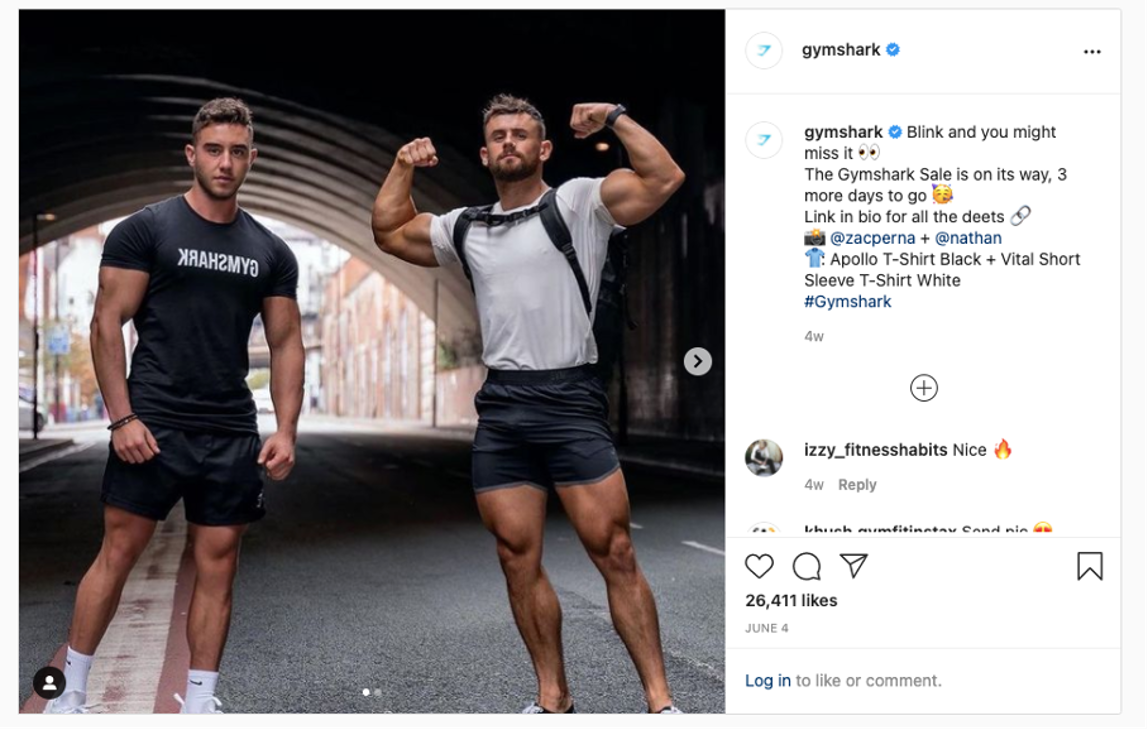
3. Build your list in advance
Your email list is one of the most potent tools in your Black Friday marketing arsenal.
It allows you to communicate directly with your audience, tease upcoming deals, and drive traffic to your site when it matters most. However, to maximize the effectiveness of this channel, you need to start building and nurturing your list well before the big day.
One of the most effective ways to grow your list quickly is through strategically placed popups.
Take this example from Obvi.
The week before Black Friday, Obvi ran a “teaser campaign” designed to build anticipation and grow their SMS list. Their goal was simple: collect as many phone numbers as possible, so they could reach these subscribers directly with their Black Friday offers.
To achieve this, they used the exit-intent popup below.
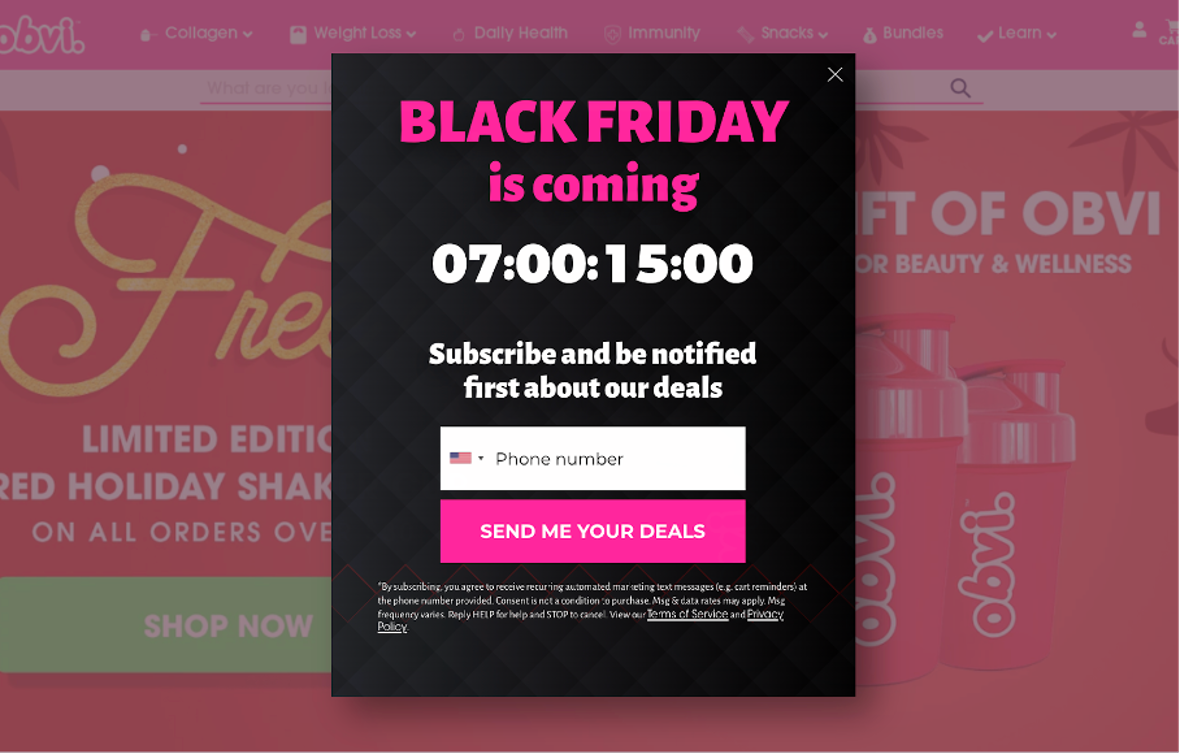
Here’s another example employing a similar strategy:
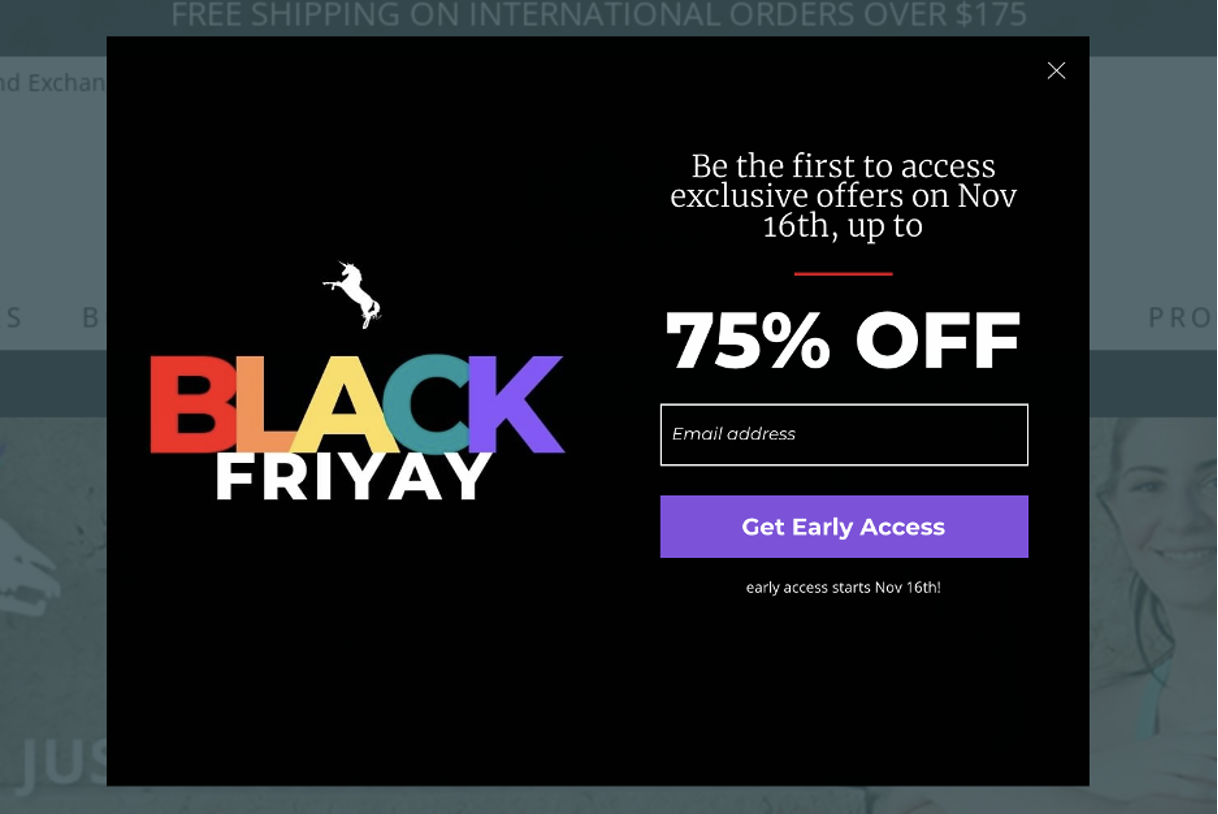
In both cases, they used the “be the first” approach, which is effective because it taps into a psychological trigger known as FOMO (fear of missing out). By positioning your early access as something exclusive, you’re creating a sense of urgency and importance around joining your list.
This strategy not only helps you grow your list but also ensures that the people who sign up are genuinely interested in what you have to offer, making them more likely to convert when you launch your Black Friday promotions.
Here are some list-building popup templates you can try:
4. Run an early Black Friday sale
Get ahead of the competition by launching a pre-Black Friday sale. While everyone else is focused on the big day, you can start driving sales earlier, capturing customers who are eager to shop before the rush.
This approach not only gives you a head start on your revenue goals but also provides valuable insights into what’s resonating with your audience, allowing you to refine your offers before the main event.
Check out Argos’ example for Pre-Black Friday deals:
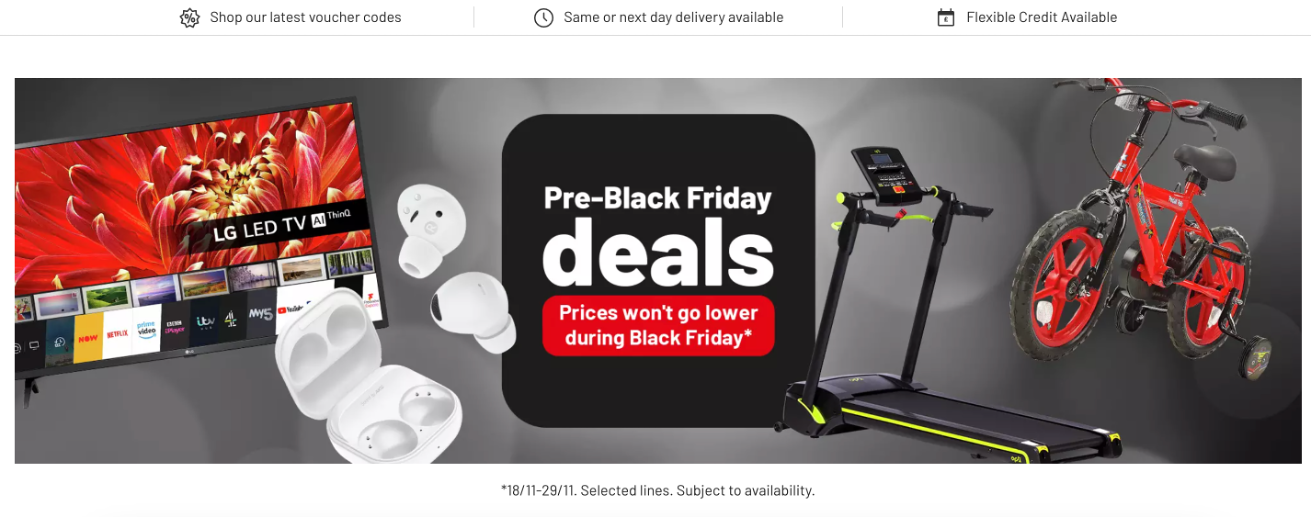
5. Offer early access to loyal customers
Your most loyal customers are the backbone of your business, and Black Friday is the perfect time to show them how much you appreciate their continued support.
Offering early access to your Black Friday deals is a powerful way to reward these top customers, making them feel valued and driving higher engagement and sales.
Sephora is a perfect example of this strategy. During their annual savings event, they give members of their Beauty Insider program the chance to shop with exclusive discounts before the general public. The higher a customer’s Beauty Insider tier, the earlier they can shop and the bigger the discounts they receive.
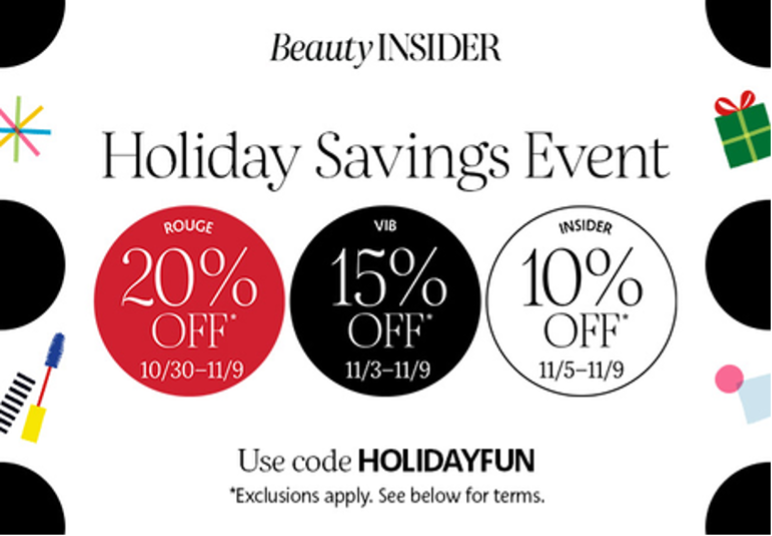
6. Promote a flash sale
Flash sales are another great Black Friday marketing idea if you want to increase holiday sales.
These short-term, high-intensity promotions can generate significant buzz, increase traffic to your site, and lead to a surge in sales—all within a limited window of time.
The psychology behind flash sales is simple: when people know that an offer is only available for a short time, they’re more likely to act quickly to avoid missing out. This phenomenon, known as the scarcity principle, can be incredibly effective during high-competition periods like Black Friday.
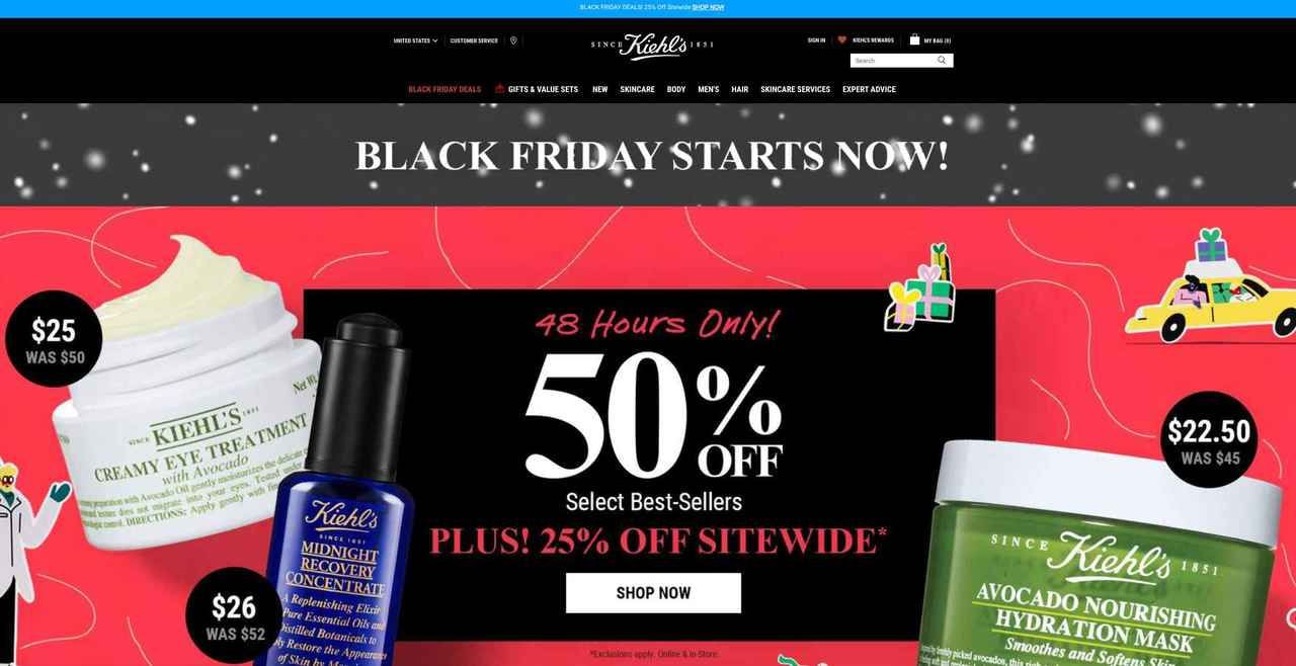
7. Create bundle deals
Bundle deals are a great way to increase the average order value. By packaging complementary products together at a discounted rate, you provide more value to your customers while moving more inventory.
PlayStation has perfected the art of the bundle deal. During Black Friday, they often offer bundles that include a console, a popular game, and additional accessories like extra controllers or a subscription to their online services—all at a discounted rate compared to buying each item separately.
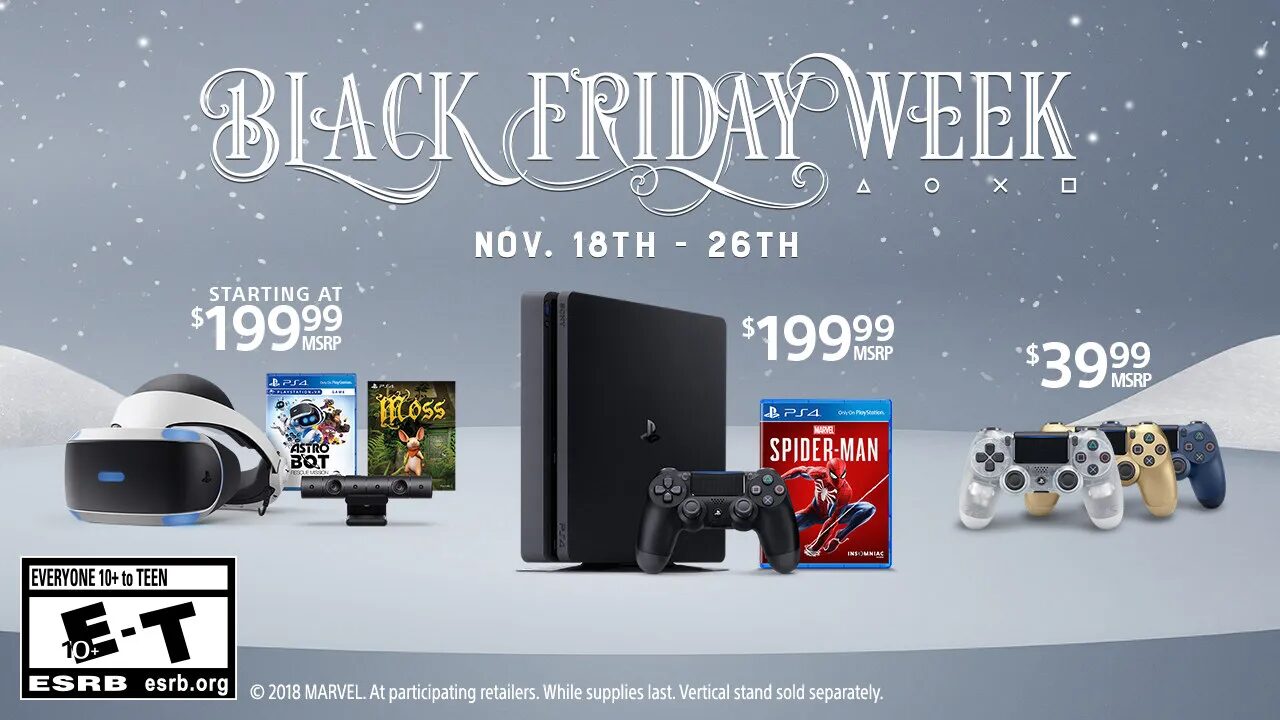
To create effective bundle deals, choose products that naturally complement each other and enhance each other’s value.
For instance, if you sell electronics, consider bundling a smartphone with accessories like a case, screen protector, and charging cable.
Additionally, the discount on the bundle should be significant enough to make it a no-brainer for the customer.
8. Offer tiered discounts
Encourage larger purchases by offering bigger discounts for higher spending thresholds.
Tiered discounts work by tapping into customers’ desire to maximize savings. When customers see that they can unlock bigger discounts by spending a bit more, they’re often willing to add extra items to their cart to reach the next discount level.
For example, a tiered discount might look something like this:
- Spend $50, get 10% off
- Spend $100, get 15% off
- Spend $200, get 20% off
Here’s an example from ZooShoo, promoting their Black Friday tiered discount through a popup:
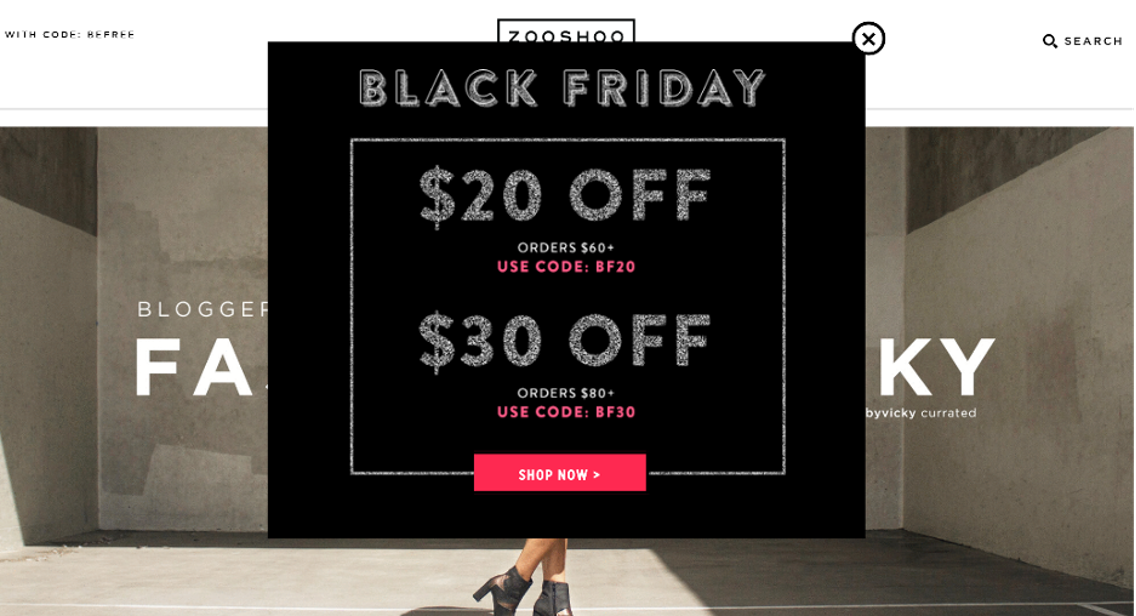
9. Offer a free gift
Who doesn’t love getting something for free?
Offering a free gift with purchase can be the perfect incentive to encourage online shoppers to complete their orders during Black Friday.
It’s a simple yet effective way to add extra value to their shopping experience, making them feel like they’re getting more for their money. The key is to ensure that the free gift is relevant, valuable, and appealing to your target audience.
Check out this example where a free gift was used as an incentive to reduce cart abandonment:
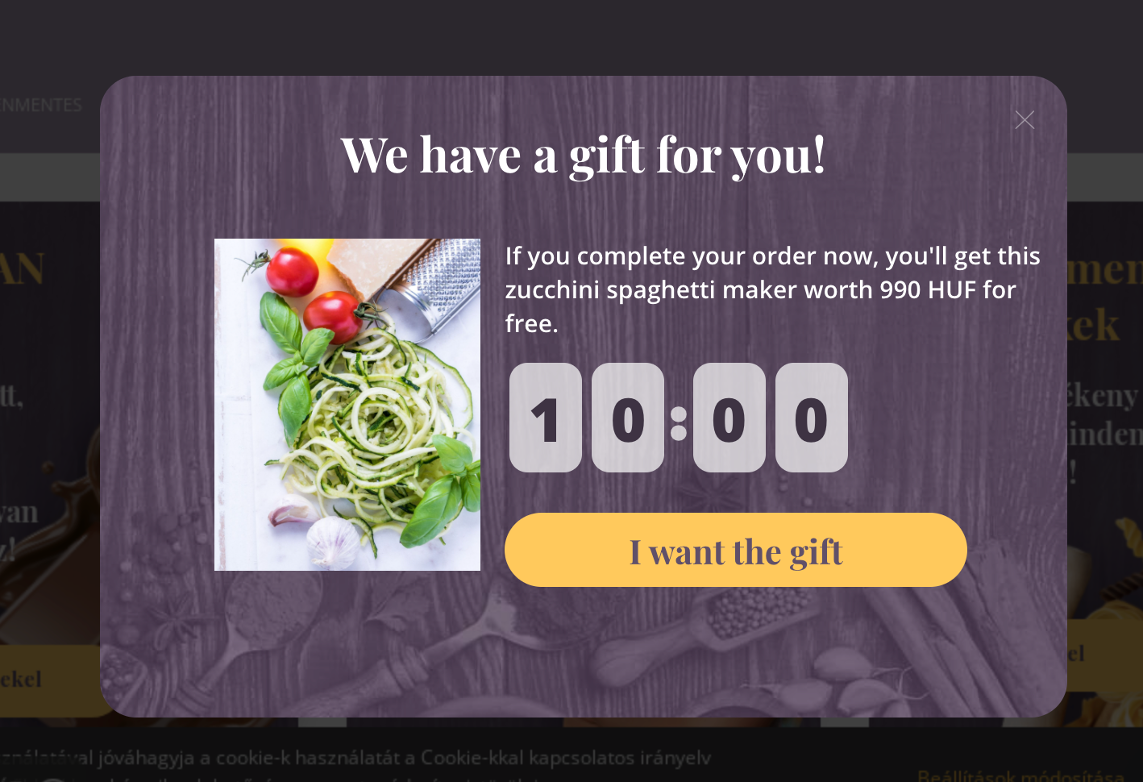
Beauty brands are particularly known for their strategic use of free gifts. Many offer free samples or travel-sized products as gifts with purchase, especially during big sales like Black Friday.
For instance, a customer buying skincare products might receive a free mini moisturizer or a deluxe sample of a new serum. These gifts are not only appreciated by customers but also give them a chance to try new products, which could lead to future purchases.
10. Offer free shipping
Shipping costs are one of the most common reasons customers abandon their carts, especially during high-volume shopping events like Black Friday. Offering free shipping can effectively eliminate this barrier, making it easier for customers to complete their purchases and driving higher conversion rates.
Use dynamic shipping bars on your website to highlight the free shipping threshold. These bars can display how much more a customer needs to add to their cart to qualify for free shipping.
For example, if a customer has $40 worth of items in their cart and your free shipping threshold is $50, the bar might say, ‘Add $10 more to your cart to qualify for free shipping!’
This real-time feedback can encourage customers to keep shopping until they reach the threshold, which also helps to increase your average order value.
Get started with these dynamic shipping bar templates:
11. Promote cart abandonment offers
Cart abandonment is a common issue for online retailers. Shoppers often fill their carts with items, only to leave your site before completing their purchase. This can happen for a variety of reasons—unexpected shipping costs, distractions, or second thoughts.
However, all is not lost.
By using exit-intent popups, you can recapture these potential sales and turn hesitant browsers into buyers.
Exit-intent popups can be a powerful tool to recover potential lost sales. Offering a discount or free shipping to customers who are about to abandon their cart can entice them to complete their purchase.
Check out Obvi’s example: when a customer attempts to leave the site with items still in their cart, Obvi triggers an exit-intent popup. This popup not only reminds customers of the Black Friday offers—25% off and free gifts—but also emphasizes urgency by highlighting that stock is limited.
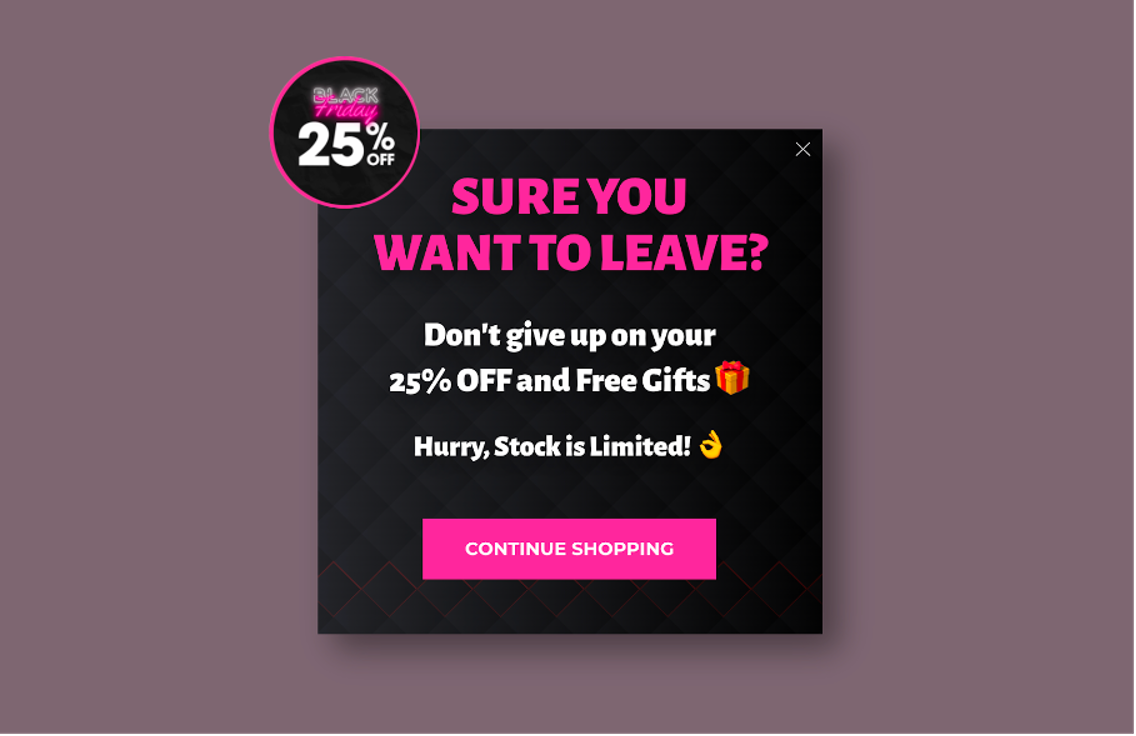
If you’re interested in implementing cart abandonment offers, try these exit-intent popup templates:
12. Personalized product recommendations
Personalization is key to converting browsers into buyers. Personalized product recommendations are a powerful tool that helps guide customers toward making a purchase by suggesting items tailored to their specific interests and behaviors.
You can implement product recommendation popups that appear based on user behavior.
For instance, if a customer spends a significant amount of time on a product page without adding the item to their cart, a popup could appear with similar products or a special offer on that item.
Check out this example from Millie n Me:
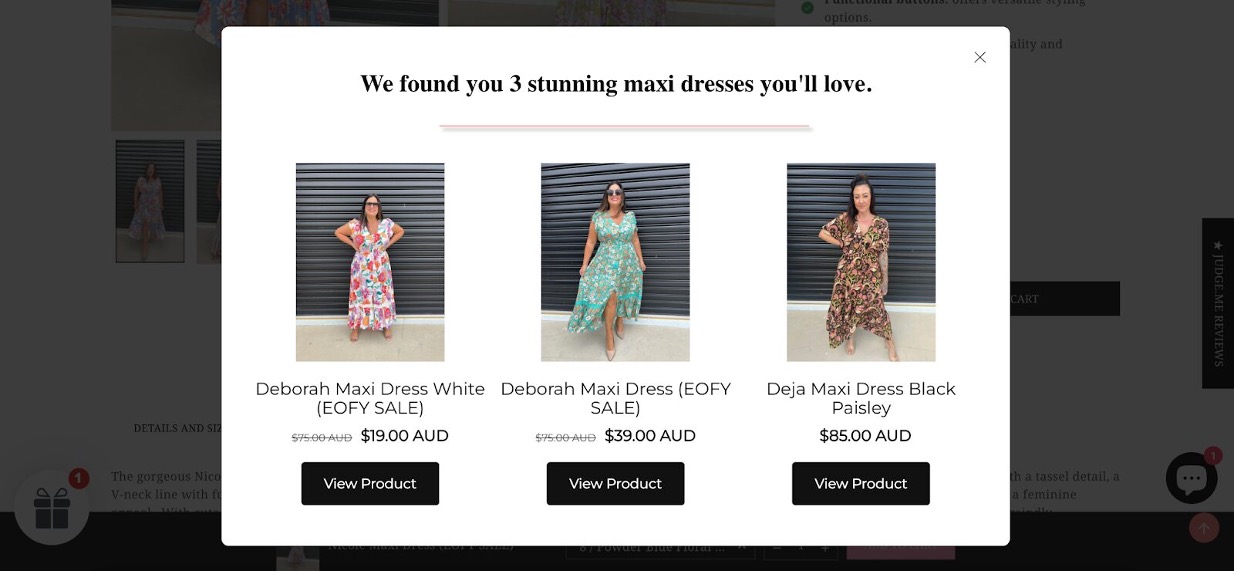
To copy their strategy, use these templates:
13. Leverage user-generated content
Encourage your customers to share their Black Friday purchases on social media.
Create a contest that motivates customers to share their Black Friday purchases using a specific hashtag.
For example, you could ask them to post a photo of their unboxing experience or how they’re using your product. To incentivize participation, offer a prize such as a gift card, a free product, or a discount on their next purchase.
You can also encourage customers to share user-generated content (UGC) by offering something in return, like a small discount on their next purchase, entry into a giveaway, or loyalty points.
Once you’ve gathered UGC, showcase it on your website or social channels to build trust and authenticity. Consider creating a dedicated section on your homepage or product pages where UGC is prominently displayed, just like Alo Yoga does.

14. Partner with influencers
Influencers can amplify your Black Friday message to a broader audience. Their followers look to them for recommendations and inspiration, giving influencers a unique ability to sway purchasing decisions.
Gymshark has built its brand largely through social media and influencer marketing, and Black Friday is no exception. Each year, Gymshark collaborates with a network of fitness influencers who promote the brand’s Black Friday deals to their followers across platforms like Instagram, YouTube, and TikTok.
Check out this example:
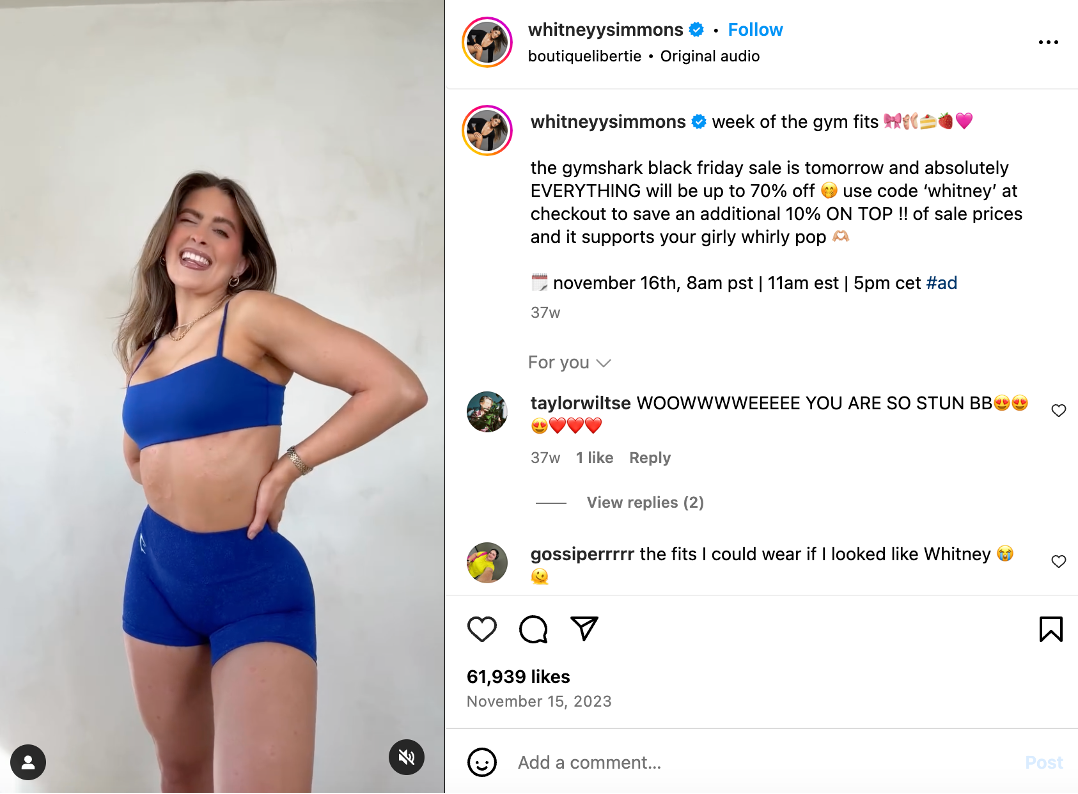
Selecting the right influencers to partner with is crucial to the success of your Black Friday campaign. Here’s how to ensure you make the best choices:
- Align with your brand values: The most effective influencer partnerships are those where the influencer’s values, style, and audience align closely with your brand. For example, if you’re a sustainable fashion brand, partnering with an influencer known for advocating ethical fashion choices will resonate more with their followers. The influencer’s content should naturally complement your brand’s image, ensuring the partnership feels authentic.
- Look at engagement, not just follower count: While it’s tempting to go for influencers with the largest followings, engagement is often a more critical metric. An influencer with 50,000 highly engaged followers can be more valuable than one with 500,000 followers who rarely interact with their content. Look at likes, comments, shares, and the quality of interactions to gauge how engaged an influencer’s audience truly is.
- Review past campaigns: Before committing, review the influencer’s previous partnerships and campaigns. What kind of brands have they worked with? How did their audience respond? This will give you insights into what works and what doesn’t, helping you to refine your approach. If an influencer has successfully driven sales for similar brands, they’re likely to do the same for you.
- Consider micro-influencers: Don’t overlook micro-influencers—those with smaller but highly loyal and niche followings. Micro-influencers often have stronger, more personal connections with their followers, which can lead to higher engagement rates and more genuine interactions. For smaller brands or niche products, micro-influencers can be a cost-effective and impactful choice.
15. Utilize interactive content
Interactive content can engage customers in a fun and memorable way, making your brand stand out and driving higher engagement and conversions.
Here are some popular forms of interactive content that you can use to engage customers during Black Friday.
Quizzes: Create fun and engaging quizzes that align with your brand and products. For example, a fashion retailer might create a quiz titled ‘Which Black Friday Outfit Are You?’ where customers answer a series of questions and receive personalized outfit recommendations based on their results.
Try these quiz templates to get started:
Gamification: Adding an element of play to the shopping experience can make it more enjoyable and engaging. Consider using popups that incorporate game-like elements, such as spin-to-win wheels or scratch cards.
For instance, a spin-to-win popup could offer customers a chance to win discounts by spinning a virtual wheel. The excitement of potentially winning something valuable can increase engagement and encourage customers to make a purchase.
16. Optimize for mobile
More than half of all ecommerce traffic now comes from mobile devices. This trend is even more pronounced during major shopping events like Black Friday, where shoppers are often browsing on the go.
A website that isn’t optimized for mobile can frustrate users, leading to higher bounce rates, lower conversions, and lost revenue.
Mobile optimization ensures that your site loads quickly, is easy to navigate, and provides a smooth checkout process on smaller screens.
Additionally, mobile-specific deals and notifications can effectively drive traffic and sales from this growing segment.
17. Send email campaigns
Email marketing remains one of the most effective tools for Black Friday. Craft compelling Black Friday promotion emails that build anticipation, highlight your best deals, and create urgency.
Segment your email list based on customer behavior, purchase history, and preferences. This allows you to send more relevant offers to each segment.
For example, loyal customers might receive early access to deals…

… while new subscribers could be offered a special welcome discount.
To get the most out of your email marketing campaigns, use countdown timers and urgent language to create a sense of urgency.

Phrases like “Limited Time Offer,” “While Supplies Last,” or “Only a Few Hours Left” can motivate customers to act quickly.
Remember: don’t stop after the first email. Send follow-up emails throughout Black Friday weekend to remind customers of your deals, highlight new offers, or notify them when a popular item is back in stock.
Follow-up emails help keep your brand top-of-mind and can capture additional sales.
18. Run social media ads
Social media ads can significantly boost your visibility during Black Friday. With millions of users scrolling through their feeds daily, social media ads allow you to reach a wide audience.
Focus on the platforms where your target audience is most active. For example, Instagram and TikTok are ideal for reaching younger audiences, while Facebook might be better suited for older demographics.
Tailor your content and ad format to each platform’s strengths, and test different formats to see what resonates best with your audience. Video ads are great for storytelling and showcasing products in action, while carousel ads allow you to display multiple products in a single ad.
Don’t hesitate to experiment with formats like Instagram Stories, TikTok challenges, or Facebook’s collection ads to find what works best.
19. Improve website performance
A slow website can cost you sales. Optimize your site’s speed and ensure your servers are ready to handle the increased traffic.
A fast, smooth shopping experience will keep customers on your site and reduce the likelihood of them bouncing to a competitor.
20. Streamline checkout process
A complicated or lengthy checkout process is one of the primary reasons customers abandon their carts.
Simplifying and optimizing the checkout process removes barriers that might otherwise prevent customers from completing their purchases.
Offer a guest checkout option, simplify the checkout form, provide multiple payment options, and consider implementing one-click checkout for returning customers.
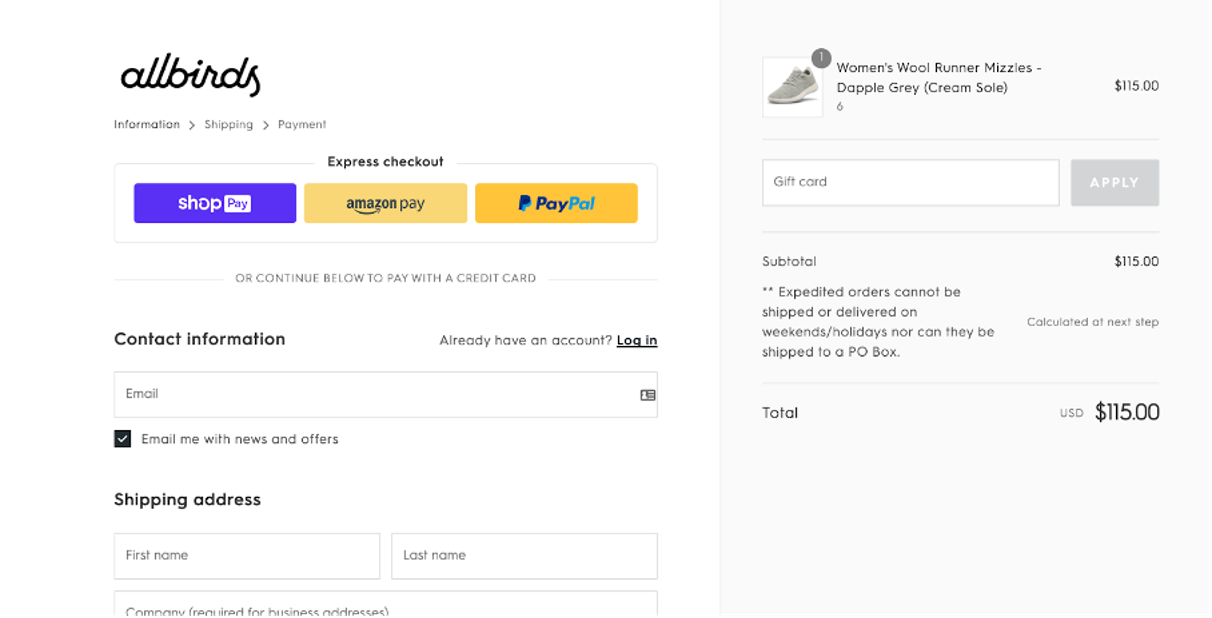
Recommended reading: 16 Ecommerce Checkout Best Practices to Optimize Yours
21. Provide exceptional customer support
Black Friday is one of the busiest shopping days of the year for online stores. Providing exceptional customer support during this time is crucial for maintaining customer satisfaction.
To achieve this, thoroughly prepare your support team, leverage technology like chatbots and AI, and ensure that every customer interaction is handled with care and efficiency.
Additionally, create a comprehensive FAQ section on your website that addresses common Black Friday questions, similar to what Gymshark does. This should include information on deals, shipping, returns, payment options, and any special terms related to the event.
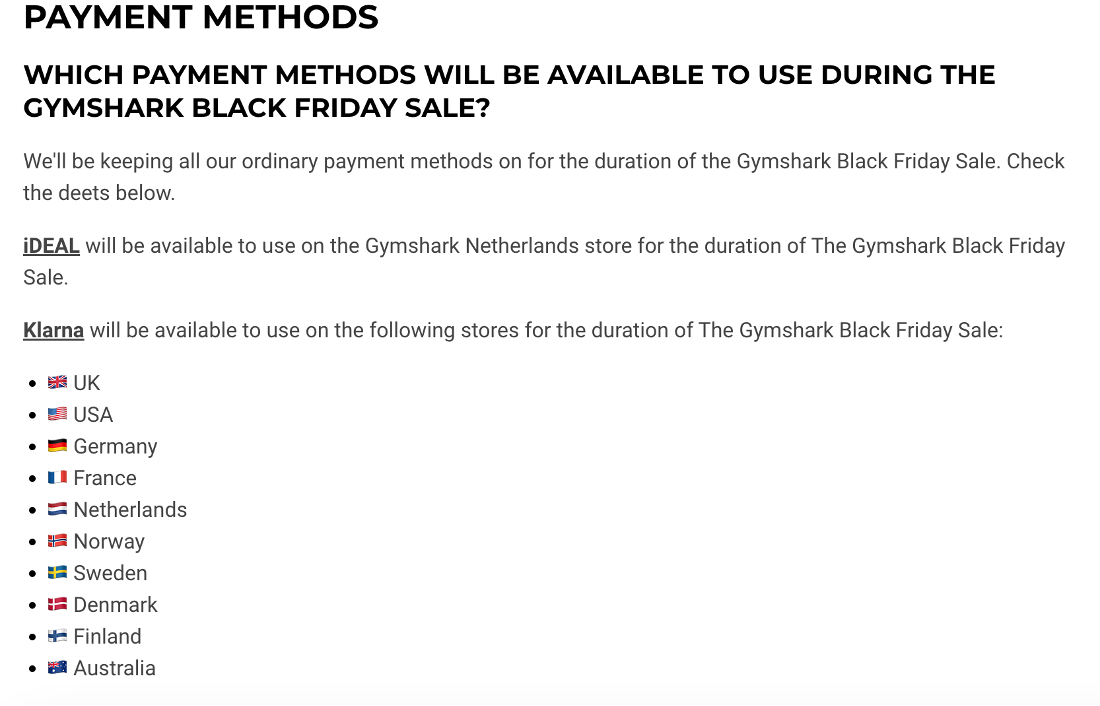
A well-organized FAQ can reduce the number of support inquiries and help customers find answers quickly on their own.
22. Ask for post-purchase feedback
After the sale, ask your customers for feedback. This gives you direct insight into their experience, revealing what worked well and what could be improved.
Use popups on your website to collect feedback from customers after they’ve made a purchase. These popups can appear on the order confirmation page. Keep the questions simple and straightforward, focusing on key aspects of the shopping experience.
You can also pay attention to what customers are saying about their Black Friday experience on social media and review platforms. This can provide additional insights that might not be captured through formal feedback channels.
23. Send follow-up emails
After the rush of Black Friday, your relationship with customers doesn’t end once they’ve made a purchase—it’s just beginning.
Follow-up emails are a powerful way to engage customers post-purchase, show your appreciation, and encourage them to return for future shopping.
By crafting thoughtful and timely follow-up emails, you can reinforce customer satisfaction, build loyalty, and even drive additional sales.
24. Retargeting campaigns
Retargeting campaigns are an effective way to re-engage customers who have visited your site but left without making a purchase.
Entice them to return by offering exclusive post-Black Friday deals. For example, you could offer a limited-time discount or free shipping to users who saw your Black Friday deals but didn’t make a purchase.
Highlight these offers in your retargeting ads to create a sense of urgency and encourage customers to act quickly.
While it’s important to keep your brand top-of-mind, bombarding customers with too many ads can lead to ad fatigue. Set frequency caps to limit the number of times a user sees your retargeting ads, ensuring they remain effective without becoming annoying.
25. Track key metrics
Tracking key metrics is essential for understanding the success of your Black Friday campaigns.
Focus on metrics like conversion rates, average order value, and cart abandonment rates to gauge what’s working and what isn’t.
26. Use data for real-time adjustments
Don’t hesitate to pivot your strategy based on performance data. If you notice that certain aspects of your campaign aren’t performing as expected, making adjustments on the fly can help you optimize results and capitalize on opportunities.
Using data for real-time adjustments ensures that your marketing efforts remain agile and effective, even when faced with unexpected challenges.
27. Run A/B tests
During high-stakes events like Black Friday, even small improvements in conversion rates can lead to significant increases in sales.
A/B testing provides a systematic way to identify the most effective elements of your campaign, from the wording of a headline to the color of a call-to-action (CTA) button.
Key areas to consider for A/B testing:
- Landing pages
- Email subject lines
- Call-to-action buttons
- Popups
- Discounts
- Product images and descriptions
For example, Crown & Paw ran an A/B test on the headline of their landing page during a major campaign. They tested different value propositions to see which one would resonate best with their audience.
The winning headline led to a 16% increase in orders, demonstrating the power of A/B testing in driving significant improvements in conversion rates.
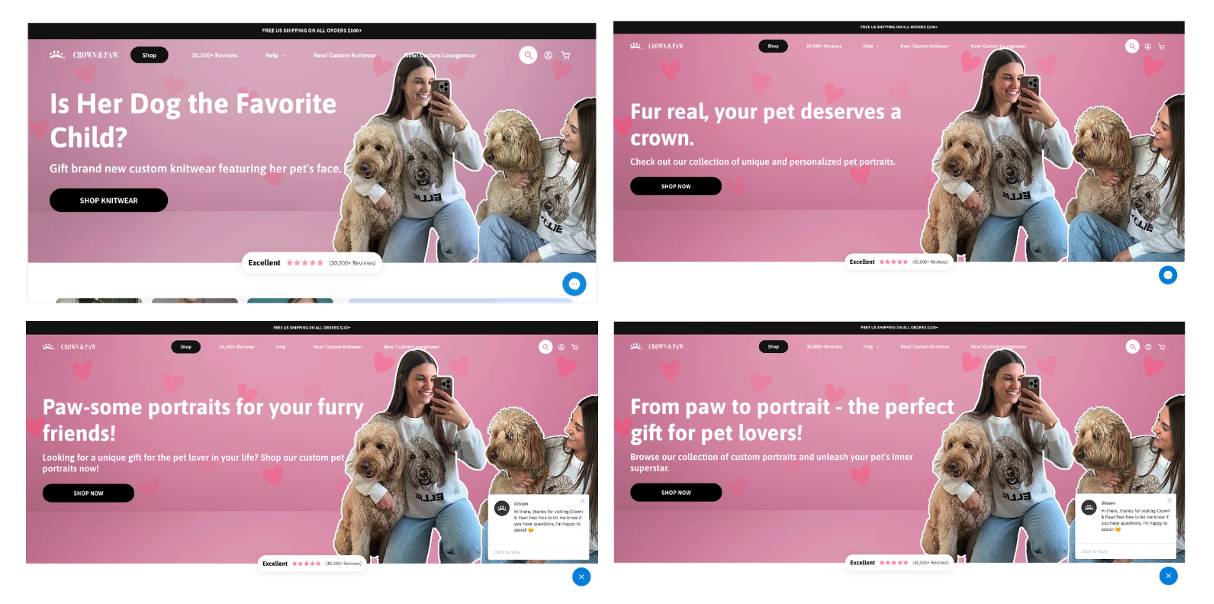
Another example comes from Obvi. They tested their popup with and without a countdown timer, and the popup with the countdown timer increased their conversion rate by 7.97%.
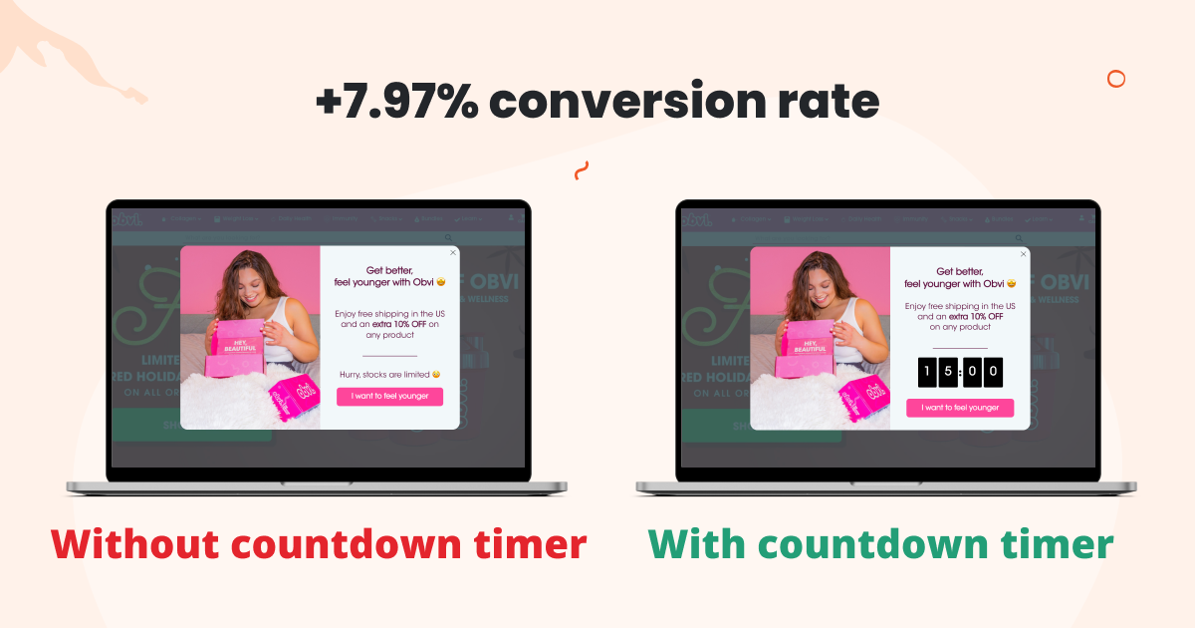
28. Promote sustainable practices
In today’s increasingly eco-conscious world, many Black Friday customers are looking for brands that prioritize sustainability.
Promote sustainable practices during your Black Friday campaign, such as using eco-friendly packaging or offering carbon-neutral delivery.
This approach will help attract environmentally conscious shoppers and differentiate your brand from competitors.
29. Partner with charities
Partnering with a charity can add a feel-good factor to your Black Friday campaign. Consider donating a portion of your profits to a social cause, and encourage your customers to contribute as well.
This not only offers customers an opportunity to make a difference with their purchases but also helps your brand stand out in a crowded market by associating your promotions with a meaningful cause.
This can strengthen customer loyalty, boost brand perception, and create a more positive shopping experience.
30. Post-event analysis
Once the frenzy of Black Friday subsides, the work is far from over.
Conducting a thorough post-event analysis is crucial for understanding how your campaigns performed, identifying what worked well, and pinpointing areas for improvement.
This analysis not only helps refine your strategies for future Black Friday events but also provides insights that can be applied to your overall marketing efforts throughout the year.
FAQ
What is Black Friday marketing?
Black Friday marketing refers to the marketing strategies ecommerce stores use to promote their products and drive sales during the Black Friday shopping event.
How to announce a Black Friday sale?
Announce your Black Friday sale through various channels such as email, social media marketing, and your website. Use eye-catching graphics and compelling copy to grab attention.
How do you attract customers on Black Friday?
Attract customers with exclusive deals, personalized offers, and engaging content. Leveraging social proof, influencer partnerships, and user-generated content can also enhance your appeal.
How to run successful Black Friday sales?
Plan ahead, build anticipation, and execute your strategy across multiple channels. Focus on providing value to your customers, whether through exclusive discounts, free gifts, or exceptional service.
Wrapping up
Black Friday offers a unique opportunity to boost sales and reach new customers.
By implementing these 30 Black Friday marketing strategies (or at least a few of them), you’ll be well on your way to a successful Black Friday.
Remember, the key is in the preparation—start early, stay flexible, and make the most of your Black Friday event. Good luck!
Migration has never been easier
We made switching a no-brainer with our free, white-glove onboarding service so you can get started in the blink of an eye.
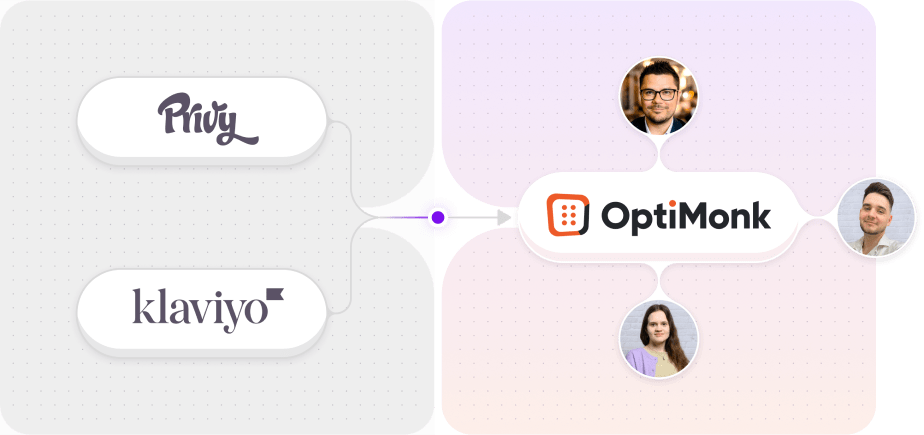
What should you do next?
Thanks for reading till the end. Here are 4 ways we can help you grow your business:
Boost conversions with proven use cases
Explore our Use Case Library, filled with actionable personalization examples and step-by-step guides to unlock your website's full potential. Check out Use Case Library
Create a free OptiMonk account
Create a free OptiMonk account and easily get started with popups and conversion rate optimization. Get OptiMonk free
Get advice from a CRO expert
Schedule a personalized discovery call with one of our experts to explore how OptiMonk can help you grow your business. Book a demo
Join our weekly newsletter
Real CRO insights & marketing tips. No fluff. Straight to your inbox. Subscribe now
Nikolett Lorincz
- Posted in
- Marketing
Partner with us
- © OptiMonk. All rights reserved!
- Terms of Use
- Privacy Policy
- Cookie Policy
Product updates: January Release 2025


